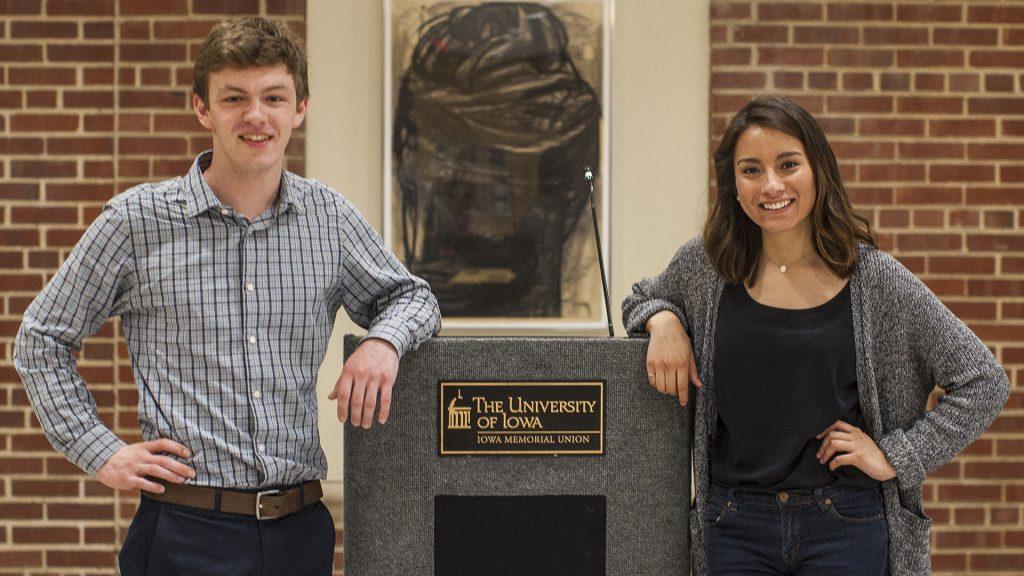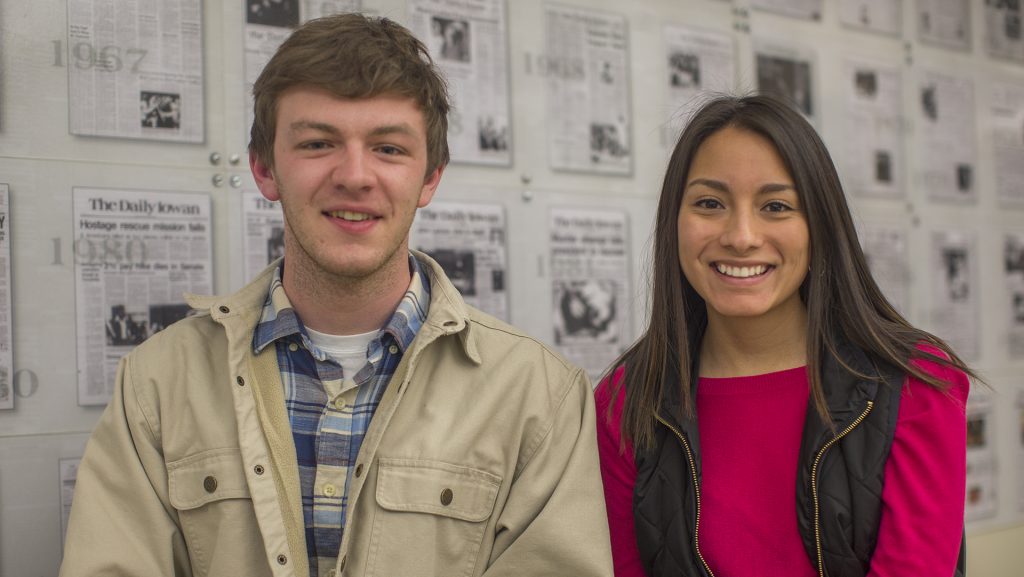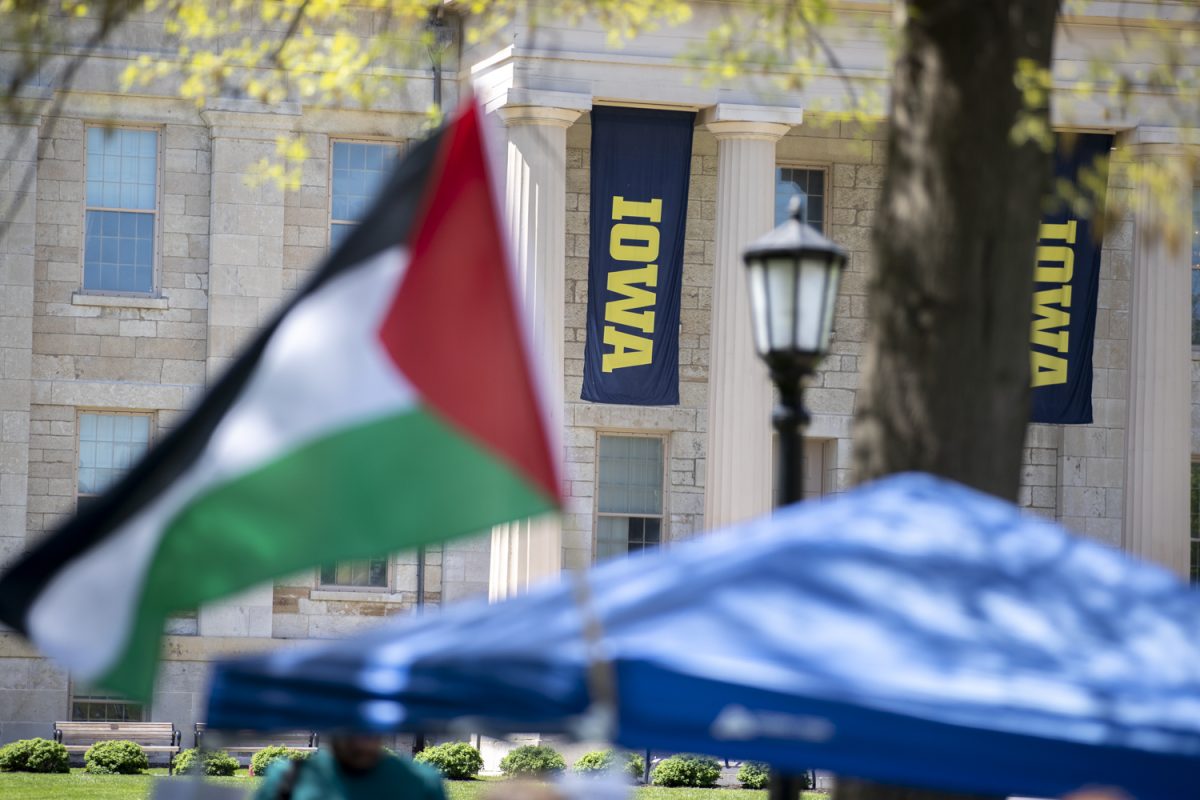University of Iowa Student Government officers reviewed a semester of their major accomplishments and their plans for the final months of their terms leading the organization in an interview with The Daily Iowan on Dec. 1. Continue reading the DI for further insight from this conversation to learn more about UISG’s efforts to address issues such as affordability, food insecurity, and other initiatives.
DI: Would you guys like to start by discussing UISG’s accomplishments this semester?
Jacob Simpson: We had a really great semester building on our progress from the summer, when we were meeting with campus partners, and building those relationships, and prepping for when most of UISG members came back during the fall, but one of our greatest accomplishments so far has definitely been the airport shuttle.
We sent that out before Thanksgiving break and we immediately had so much social-media attention from it. And we had more than 50 students utilize the service. The first trial we had and offered again this winter break and another thing that just came out was the Hawkeye Meal Share program, and we worked with the Division of Student Life to collect leftover meal swipes from students who have a dining contract. Then students who are facing food insecurity can come into the Office of the Dean of Students and receive a short-term support to alleviate food insecurity.
We’ve also had a lot of success, I’d say, in terms of governmental relations — both with the Board of Regents but also with the state Legislature. So we have visited with Regent [Larry] McKibben, Regent [Subash] Sahai in their hometowns, and we just hosted Regent [Sherry] Bates on campus yesterday, gave her a tour of a number of different services from the Food Pantry to the embedded counselors to the cultural centers talking about the elements of student life that she wouldn’t see during the normal course of her position.
Lilían Sánchez: I think Jacob did a really good job at hitting the key initiatives that we’ve been able to highlight over the semester. There’s been a ton others that haven’t been as explicit, but I think it’s important to acknowledge that we have to attribute our success to the amount of support we’ve received from the community both on and off campus.
I think that this year we did an amazing job at recruiting and organizing a supportive and strong team within UISG, and of course the UI community has welcomed us with open arms and gone beyond what they needed to to help support us with the initiatives that Jacob mentioned — whether it was airport shuttle or the Hawkeye Meal Share program or anything else — we’ve worked with the Division of Student Life, we’ve worked with the Office of Financial Aid. We’ve worked with a lot of areas, campus partners, that have really only strengthened our initiatives and make them possible. So I think we couldn’t have had as much success without them.
Also, just we’ve been open to change, I think, and open to learning as we go, and learning from our mistakes, and being humble in that we don’t know everything. We have had great success with the [communications] team, opening up more positions within the executive branch. In that, reconfiguring how student government is now not working as separate branches but is allowing for that autonomy of branches and working together collaboratively and more closely. We’ve seen great successes in terms of our director of academic-affairs position. That was a new position we started this year, and Tristan Schmidt has been doing an amazing job being involved with the 2020 initiative.
Simpson: Just for context, we had under 15 executive positions last year, and then this year we have around 25. So we expanded the executive branch significantly. That’s from the addition of the [communications] team which equals — we added seven positions there. And then the director of academic affairs, director of student services, deputy director of finances as well. So big expansion, big impact.
Sánchez: The last part that I would also like to attribute our success to is our strategic plan. We are in the process of — it’s a living document, so we are in the process of analyzing it and figuring out in what we ways our organizations can continue to grow. The strategic plan has kept us in check in a way in terms of rooting our values, our mission, and using it as a source to educate and work on our professional development within the organization.
So we will have a retreat in which members of student government learn about the history of UISG so we don’t reinvent the cycle as well as learn about the structure, how to finish an initiative, and what not, so we hope that will continue to be a source of success for our organization.
DI: Can you elaborate on the strategic plan and how that outlines your goals?
Sánchez: The strategic plan incorporates what our mission is in student government. It has our values and delves in our plans and strategies of how we plan to grow as an organization.
For example, one of them last year was professional development. We noticed that a lot of people last year were either new to student government because sometimes it can be intimidating to know what the system looks like and how to navigate it, we wanted to ensure people had that institutional knowledge but also gain transferable skills to use outside of the organization, so professional development was something we wanted to do to help strengthen our members.
So this year we’ve had a lot of professional development whether it’s having them attend trainings, or allowing them to go to other conferences and learn about other student governments to bring back ideas. That specific then turned into an initiative, which then turned into practicalities that have benefited our organization, and we’ve seen some tangible changes.

DI: You guys just got back from visiting with some lawmakers in the capital. What sort of work did you do there?
Simpson: What I appreciated about our trip to Washington, D.C., was that it kind of demystified federal government and how it is placed in higher-education policy and regulation. So we met with our Iowa delegation. Some one-on-one and expressed our priorities for making the university affordable and accessible and maintaining its world-class quality. So we’ve had conversations with people about FAFSA simplification or the RISE Act, which would allow students with disabilities to transfer [Individualized Education Plans] and other documents that would help them with accommodations on campus. And it was also important that we talk about safety on campus. CASA and any other initiatives that we could to make sure that we are working to eliminate sexual assault.
Sánchez: So with the campus accountability and safety act we think the University of Iowa is doing a great job or the best it can to provide safety on campus, but we also know that lobbying for legislation like that can benefit our peers, so that was also another one of our reasons we wanted to advocate for that, and there were other issues that we wanted to make sure Iowa had a voice at at the federal level. That included support for first-generation students and underrepresented students on campus, particularly continuing the federal government support programs like TRIO and those sort of federal grants.
DI: What are some of your plans for next semester? I suppose you probably have to have some plans in place now for them to come fruition next semester.
Simpson: So we have a lot of stuff coming down the pipeline. One of my favorite things we are working on — we made financial aid a priority this year. We are working with campus partners to create a retention grant, and the idea is that students who have more than $100 on their U-bill at the end of the semester are not able to register until they get that cleared. A number of universities now have a targeted intervention mechanism that uses financial aid to alleviate a small amount so that people can register, and we are. If everything goes according to plan we will launch a pilot program in the spring for that program.
Other things include a course-reserve program for textbook affordability. So some classes now, the professor says that the library has one or two copies of the textbook for this course. We are looking to provide more systematic initiatives so that more classes that have expensive, large textbooks are in the library so that students don’t have to go out and buy them themselves or buy a used copy. We’ve had really great success with the library so far on a number of universities have great programs. Like Lilián said, we’re make this efficient. We’re not reinventing the wheel on some of these things, we’re targeting areas of improvement and doing our research, finding solutions that work at other universities and then implementing them here.
Sánchez: We were talking about first-generation students earlier and one of the things we’re really excited about this year is that we’re in the process of arranging and coordinating a first-generation summit for April 7 in the spring. We got very lucky with that initiative in the sense that the university had established a first-gen task force, and so we are going to strengthen our efforts to make it more intentional and more education-based. So we will be having the summit catered not just to undergraduate students but also offered as an opportunity for mentorship and networking among graduate and professional students as well as faculty and staff, so we’re hoping that goes really well in the spring and that the institution will garner that as a seed or a starting point to continue those sustainable efforts across years.
We will also be doing a lot of work in terms safety on campus. We actually had a meeting today thinking of things we could do to combat sexual assault, and we are hoping that through the It’s on Us Action Week that we’ll work with campus partners to be more intentional in outreach toward students that perhaps in the past haven’t learned much in how to combat sexual assault but then also cater specific conversations around healthy masculinity and even extend the conversation beyond just violence toward women but gendered violence as well, particularly to the LGBTQ community.
DI: How would you say the amount of legislation passed so far this year compares with usual amounts?
Simpson: Every year in UISG is different in terms of amount of legislation passed, and that’s because UISG changes every year — the culture and also how things are accomplished. It may be the case that initiatives that are passed or are created don’t require legislation to be implemented, and I would say we’ve accomplished a number of initiatives this year that didn’t necessarily require legislation. That includes things like the Hawkeye Meal Share program.
Then there are those programs that say we need an allocation from our contingency account that’s above $5,000, and that’s when we go to the Senate and say will this be a priority for us this year, and that’s exactly what happened with the airport shuttle. They allocated $20,000 to the program. There’s been resolutions on DACA and other issues, so I’d say the Senate is extremely engaged in what’s going on in the university. It’s just a matter of the methodology we use to accomplish our work, and I think this year there’s been an emphasis on collaboration with campus partners in a way that doesn’t require as much legislation, although I’d say the legislation we’ve passed this year has done a great job of advancing our work.
Sánchez: And I think Jacob has a point to that sometimes legislation is used as a way to determine how much work is being done, but that’s not necessarily what is really true. So having served as a senator before and seeing how the Senate has functioning this year, not only are we focusing on external issues, but we’re also being very introspective in our organization. Not only figuring out how best we can function but also accessibility.
DI: Do you think you’ll need to put through a lot more legislation to use the amount of money you need to in the contingency account?










